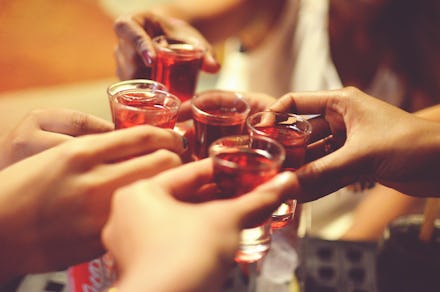Why you have weird dreams after drinking, according to science

Occasionally, I like to wind down in the evenings by sipping on some good bourbon — but experience has taught me that I need to be careful about the timing. If I imbibe too close to bedtime, I drift in and out of sleep, hopping from one intense, bizarre dream to another. Apparently, I’m not alone, as evidenced by the plethora of Reddit threads devoted to the topic. But why does alcohol seem to give you weird dreams?
Let’s start with some sleep medicine 101: Your body cycles through four stages of sleep — stages 1 through 3, and rapid eye movement, or REM, sleep— around three to four times a night, according to Michigan Medicine. Light sleep happens during stages 1 and 2, says Kelli Janata, a sleep medicine specialist and pulmonologist at UCHealth Sleep Medicine Clinic in Longmont, Colorado, while deep sleep occurs during stage 3. Most dreaming happens during REM sleep, per Michigan Medicine. However, as the Harvard Medical School points out, we tend to forget many of them.
Maybe you've poured yourself a nightcap, thinking the alcohol would help you sleep — but that’s only partly true. Yes, alcohol does have sedative effects, which can make you fall asleep faster. “During the first half of the night [after drinking], you go into stage 3 quicker,” Janata tells Mic.
At a molecular level, alcohol boosts levels of a neurotransmitter called gamma-Aminobutyric acid, or GABA, which increases the three stages of non-REM sleep and suppresses REM sleep, at least to start out, Janata explains. As the booze wears off around halfway through the night, though, GABA levels drop, decreasing non-REM sleep and increasing REM sleep, a phenomenon known as REM rebound. Meanwhile, the disruption in your neurotransmitters can make your sleep fragmented, causing you to awaken periodically.
Remember that you cycle through the four stages of sleep a few times a night, meaning that after you finish REM sleep, you start all over again with stage 1 sleep. But now, since you’re spending so little time in light, non-REM sleep, so much time dreaming in REM sleep, and you’re waking up every and now then, you're more likely to awaken from intense dreams, Janata says. “You’ll float in and out of very vivid dreams, and you may remember them more."
In other words, alcohol can't technically be blamed for your weird dreams. It does, however, fragment your sleep so that you're more likely to remember your dreams. Also, it's important to note that all of this comes with a big caveat: Dream science is murky, meaning that experts are limited in how much they can explain why we dream the way we do.
Although Janata doesn’t encourage drinking, if you choose to drink in the evenings, you can avoid traipsing down nightmare lane by limiting yourself to one drink with dinner at around 6:00 p.m.— that is, a little bit, and early enough so that it doesn’t disrupt your sleep. “What patients do get in trouble with is leaning on alcohol as a crutch to fall asleep,” Janata says.
Not realizing their alcohol is worsening the quality of their sleep, they rely on it even more and drink caffeine or nap to help them stay up in the daytime, further messing with their sleep-wake cycle. In other words, you can enjoy the relaxing buzz, while skipping the next-level weird dreams and next-morning grogginess, if you’re mindful and plan ahead of time.